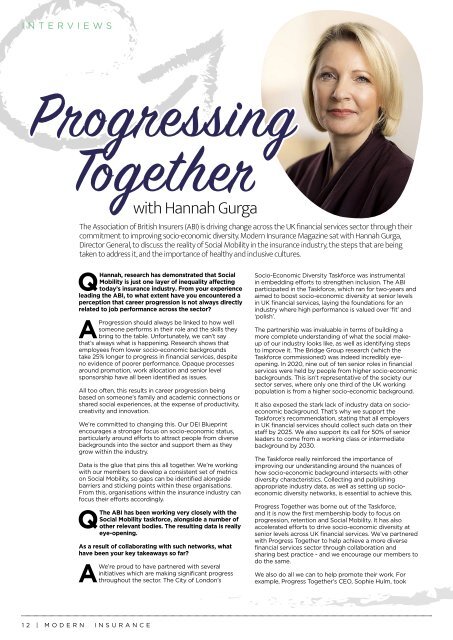Modern Insurance Magazine Issue 61
You also want an ePaper? Increase the reach of your titles
YUMPU automatically turns print PDFs into web optimized ePapers that Google loves.
INTERVIEWS<br />
Progressing<br />
Together<br />
Hannah, research has demonstrated that Social<br />
Mobility is just one layer of inequality affecting<br />
Q today’s insurance industry. From your experience<br />
leading the ABI, to what extent have you encountered a<br />
perception that career progression is not always directly<br />
related to job performance across the sector?<br />
A<br />
Progression should always be linked to how well<br />
someone performs in their role and the skills they<br />
bring to the table. Unfortunately, we can’t say<br />
that’s always what is happening. Research shows that<br />
employees from lower socio-economic backgrounds<br />
take 25% longer to progress in financial services, despite<br />
no evidence of poorer performance. Opaque processes<br />
around promotion, work allocation and senior level<br />
sponsorship have all been identified as issues.<br />
All too often, this results in career progression being<br />
based on someone’s family and academic connections or<br />
shared social experiences, at the expense of productivity,<br />
creativity and innovation.<br />
We’re committed to changing this. Our DEI Blueprint<br />
encourages a stronger focus on socio-economic status,<br />
particularly around efforts to attract people from diverse<br />
backgrounds into the sector and support them as they<br />
grow within the industry.<br />
Data is the glue that pins this all together. We’re working<br />
with our members to develop a consistent set of metrics<br />
on Social Mobility, so gaps can be identified alongside<br />
barriers and sticking points within these organisations.<br />
From this, organisations within the insurance industry can<br />
focus their efforts accordingly.<br />
The ABI has been working very closely with the<br />
Social Mobility taskforce, alongside a number of<br />
Q other relevant bodies. The resulting data is really<br />
eye-opening.<br />
As a result of collaborating with such networks, what<br />
have been your key takeaways so far?<br />
A<br />
with Hannah Gurga<br />
The Association of British Insurers (ABI) is driving change across the UK financial services sector through their<br />
commitment to improving socio-economic diversity. <strong>Modern</strong> <strong>Insurance</strong> <strong>Magazine</strong> sat with Hannah Gurga,<br />
Director General, to discuss the reality of Social Mobility in the insurance industry, the steps that are being<br />
taken to address it, and the importance of healthy and inclusive cultures.<br />
We’re proud to have partnered with several<br />
initiatives which are making significant progress<br />
throughout the sector. The City of London’s<br />
Socio-Economic Diversity Taskforce was instrumental<br />
in embedding efforts to strengthen inclusion. The ABI<br />
participated in the Taskforce, which ran for two-years and<br />
aimed to boost socio-economic diversity at senior levels<br />
in UK financial services, laying the foundations for an<br />
industry where high performance is valued over ‘fit’ and<br />
‘polish’.<br />
The partnership was invaluable in terms of building a<br />
more complete understanding of what the social makeup<br />
of our industry looks like, as well as identifying steps<br />
to improve it. The Bridge Group research (which the<br />
Taskforce commissioned) was indeed incredibly eyeopening.<br />
In 2020, nine out of ten senior roles in financial<br />
services were held by people from higher socio-economic<br />
backgrounds. This isn’t representative of the society our<br />
sector serves, where only one third of the UK working<br />
population is from a higher socio-economic background.<br />
It also exposed the stark lack of industry data on socioeconomic<br />
background. That’s why we support the<br />
Taskforce’s recommendation, stating that all employers<br />
in UK financial services should collect such data on their<br />
staff by 2025. We also support its call for 50% of senior<br />
leaders to come from a working class or intermediate<br />
background by 2030.<br />
The Taskforce really reinforced the importance of<br />
improving our understanding around the nuances of<br />
how socio-economic background intersects with other<br />
diversity characteristics. Collecting and publishing<br />
appropriate industry data, as well as setting up socioeconomic<br />
diversity networks, is essential to achieve this.<br />
Progress Together was borne out of the Taskforce,<br />
and it is now the first membership body to focus on<br />
progression, retention and Social Mobility. It has also<br />
accelerated efforts to drive socio-economic diversity at<br />
senior levels across UK financial services. We’ve partnered<br />
with Progress Together to help achieve a more diverse<br />
financial services sector through collaboration and<br />
sharing best practice - and we encourage our members to<br />
do the same.<br />
We also do all we can to help promote their work. For<br />
example, Progress Together’s CEO, Sophie Hulm, took<br />
12 | MODERN INSURANCE
















